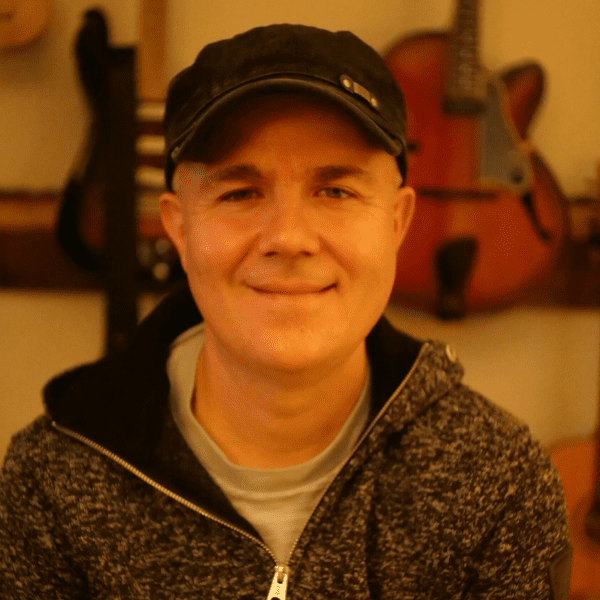Repetition is the mother of skill
This is something that I mentioned briefly in the previous improvisation article…and also ties in with the “Power of Persistence” section as well.
When you are working on improvisation at any level the ultimate goal is to try and work on an idea to the point where you can execute it comfortably and musically. Learning about symmetrical diminished scales intellectually and incorporating them in an improv setting are worlds apart. It takes the body much longer to assimilate something than the mind does. Playing is as much physical as it is mental.
Remember music is a language. Someone learning to speak the English language in the early stages of their life has to go through several stages of development. They must first learn how to use their vocal chords and mouth just to get a sound out. Then they start to learn specific words like dog, cat, mamma, and dadda, etc. As the child matures they develop a repertoire of words, and after a while they don’t struggle with accessing that information. They have heard enough and read enough that they can put these words together and communicate ideas…
Improvisation is much the same way. There is a physicality about any instrument that can and will always be the overriding factor when playing. If you don’t have technique…you need to get it. Playing in a jazz setting demands a certain amount of technical proficiency on any instrument as it is the most rhythmically (and melodically) sophisticated style of music there is. It is the ultimate hybrid of Eastern European harmony with African drum rhythms.
Once you can get around your instrument, it’s one less thing you have to deal with when playing. Then it’s time to start putting some tools in your tool box. This would include extensive chord and chord scale study. It’s really easy to get caught up in trying to learn and play everything all at once. I would say just pick a few ideas to start off with, and learn them to the point that you can assimilate them into your playing so that they sound as natural as possible.
Sometimes it’s tempting to memorize “licks”. Some people write their ideas down and memorize them. The only thing I would say is that once you have memorized a few licks…you will obviously want to start using them. Usually what happens is you will use them too often, and not make smart choices as to where to put them in your solo. If you’ve worked out a really sophisticated line that spans 4 or eight bars…you need to be able to maintain that level of sophistication before and after those measures. If the ideas before and after the “lick” aren’t as strong…that lick will sound out of place.
The gig is the ultimate litmus test for any player. If you’ve been shedding your ideas for a while, when you walk out on stage…that is the ultimate test to see where you are at. There have been times where I’ve been working on a certain idea for quite a while…and when I play the gig, I realize afterwards that I didn’t use it once. This is not necessarily a bad thing…it just means the concept wasn’t natural for me yet.
When you are performing, there simply isn’t a whole lot of time to think. In a jazz situation, you have other members on stage who are playing ideas along with you, and you as the soloist must try and react to them….and vice versa. The more you perform, the more you’ll see the holes in your playing….or the stuff you need to work on.
These days, I try and record every one of my gigs so I can listen to it at a later time. Even if the recording isn’t high resolution, I can still hear the information I need. For instance, I can hear that I dropped the time in a few spots in my solo. Maybe I repeated a lick ad nausea without even realizing it! Maybe my ideas didn’t connect with each other very well. Maybe I dropped the form…..ouch.
Listening to yourself is a tough thing sometimes. If the crowd really went nuts at the end of my gig, there is part of me that would rather commit that to memory rather than listening back to the show a week later with fresh ears and hearing what really went down…lol. I know what I’m capable of and I know my ideas. I can certainly tell when I listen back if they were grooving or not.
The only way to get good is to play a whole lot…simple. There’s a term used among musicians to describe someone when their playing is awesome…”burning”. Like, “did you hear Branford Marsalis’s group last night?…they were burnin’!” How does one achieve “burnin’ status? Someone like Branford Marsalis has gigged a whole lot. He is to the point where he can consistently dish it out night after night because he has developed that ability over time. I assure you, just because you sound good in your bedroom doesn’t mean you’ll sound good on stage…believe me…lol.
As you “play” more, and by that I mean perform….you will find that you can access large amounts of information instantly with more ease. All the stuff you have been shedding suddenly starts to sink into your musical subconscience and it suddenly starts to flow out of you. It’s like when a friend calls you…if you’re not expecting the call, you have no idea what you are going to talk about. Still, that doesn’t mean you don’t answer the phone because you know you don’t need to know what you’re going to talk about…you can react and communicate ideas without thinking about it. This is where you want to get to when you improvise.

